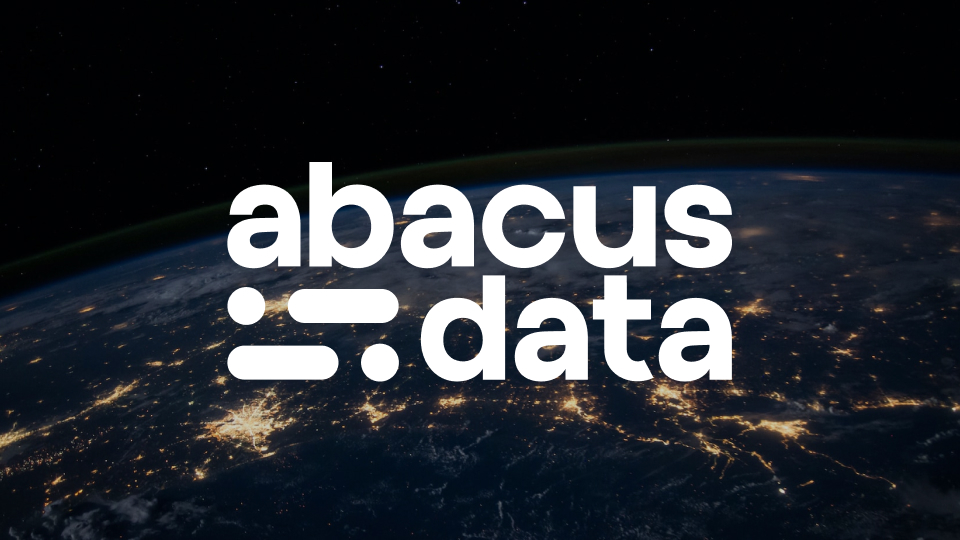Ontario PCs lead by 4 as Doug Ford’s image and performance rating improves
April 21, 2022
As we head towards the 2022 Ontario provincial election, our team at Abacus Data will be conducting regular surveys to gauge public opinion and reaction to the campaign. Clients interested in purchasing questions on our Ontario survey should reach out to Yvonne Langen.
In our first survey of the Ontario election season, we interviewed 1,500 eligible voters in the province from April 14 to 19, 2022.
Here’s what we found:
THE VOTER MINDSET IN ONTARIO
About an equal number of Ontarians feel the province is headed in the right direction than feel it is off on the wrong track. At the same time, 25% describe the current Ontario economy as excellent or good, 37% feel it is acceptable, and 38% describe it as terrible or poor.
As inflation hits a 31-year high in Canada, 62% of Ontarians say their household income is falling behind their cost of living. 26% say it is about even while 11% report their income is rising faster than the cost of living.

COST OF LIVING, HOUSING, HEALTHCARE & TAXES ARE THE TOP ISSUES DRIVING VOTES
When asked to select the three issues that are most likely to impact their votes, half of Ontarians rate reducing the cost of living as their top issue, followed by housing affordability and accessibility, improving the healthcare system, and keeping taxes from going up or reducing them.
Another 1 in 4 rated growing the economy and creating good jobs as a top issue while 22% selected responding to the COVID-19 pandemic. Furthermore, 20% rated fighting climate change and protecting the environment as a top issue.

Looking at generational differences on top issues, both millennials and older generations are just as likely to select reducing the cost of living while millennials were 10-points more likely to pick housing affordability than older generations.
Older generations were 15-points more likely to pick improving the healthcare system, 4-points more likely to pick tax improvements, and 5-points more likely to pick growing the economy. Not surprisingly, older Ontarians were much more likely to pick long-term care and seniors care as a top issue (25% vs. 11%) when compared with millennials.

When we compare those who would currently vote PC to others in the province, PC voters were more likely to select reducing the cost of living (55% vs. 46%), keeping taxes from going up (39% vs. 23%) and growing the economy and creating good jobs (35% vs. 20%) as their top issues.
PC supporters were 12-points less likely to pick climate change and the environment as a top issue than other respondents (13% vs. 25%).

61% RATE DOUG FORD’S PERFORMANCE AS PREMIER AS EXCELLENT, GOOD, OR ACCEPTABLE
When asked to rate Doug Ford’s performance as premier, 36% give Ford a positive score while 25% describe his performance as acceptable. 35% rate his performance as either poor or terrible.
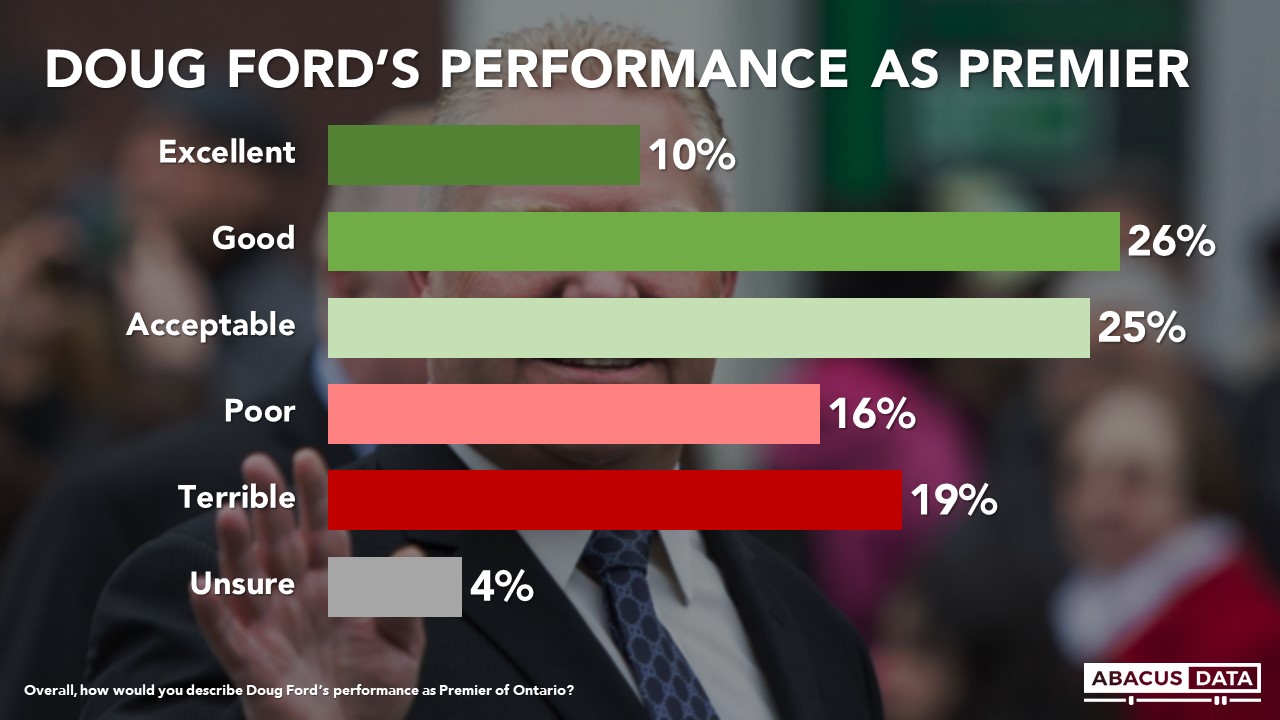
Not surprisingly, there is a strong relationship between one’s performance evaluation of the premier and vote intention.
More than half of those who think the premier has done an excellent or good job say they would vote PC. Among those who think he has done an acceptable job, 38% would vote PC, 34% OLP, and 18% NDP.
Less than 10% of those who think he has done a poor or terrible job say they would vote PC.
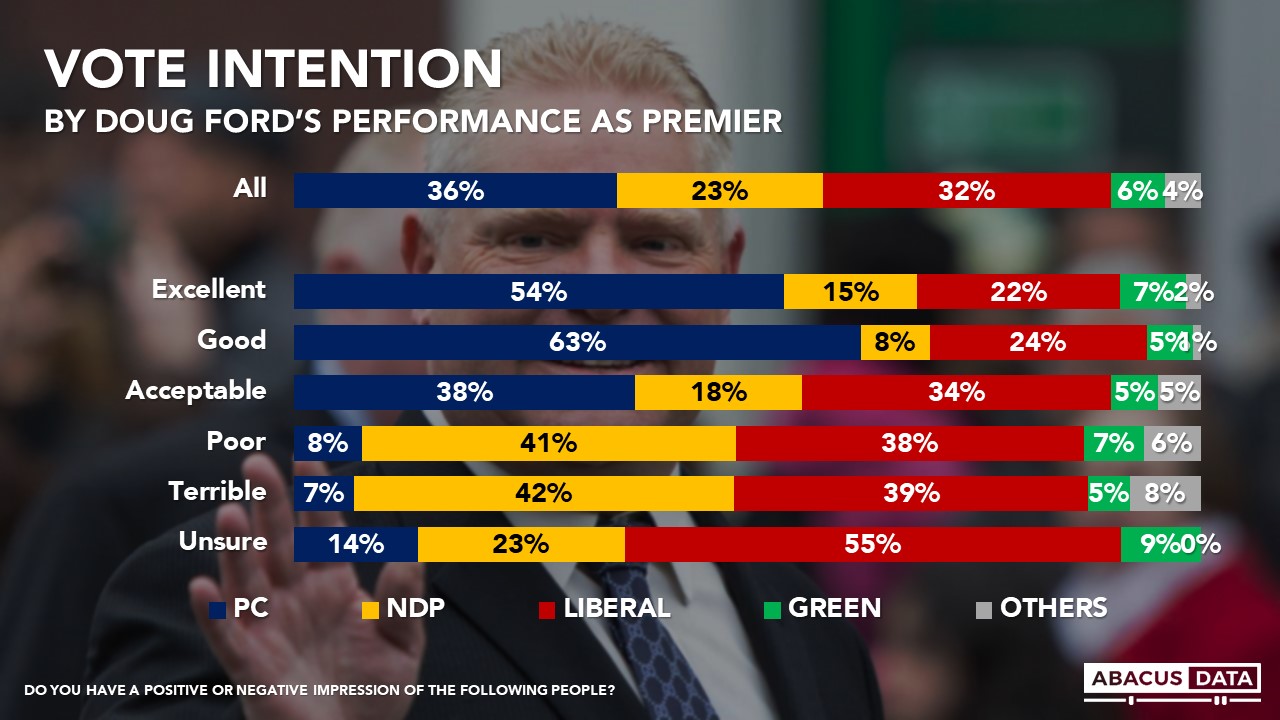
When asked to rate the premier’s performance in specific areas, a majority think he has done a good or acceptable job leading the province through the pandemic (62%), making good decisions (56%), managing the healthcare system (52%) and managing the provincial economy (57%). Ford’s performance is less positive when it comes to education, reducing the cost of living, or making housing more affordable and accessible.
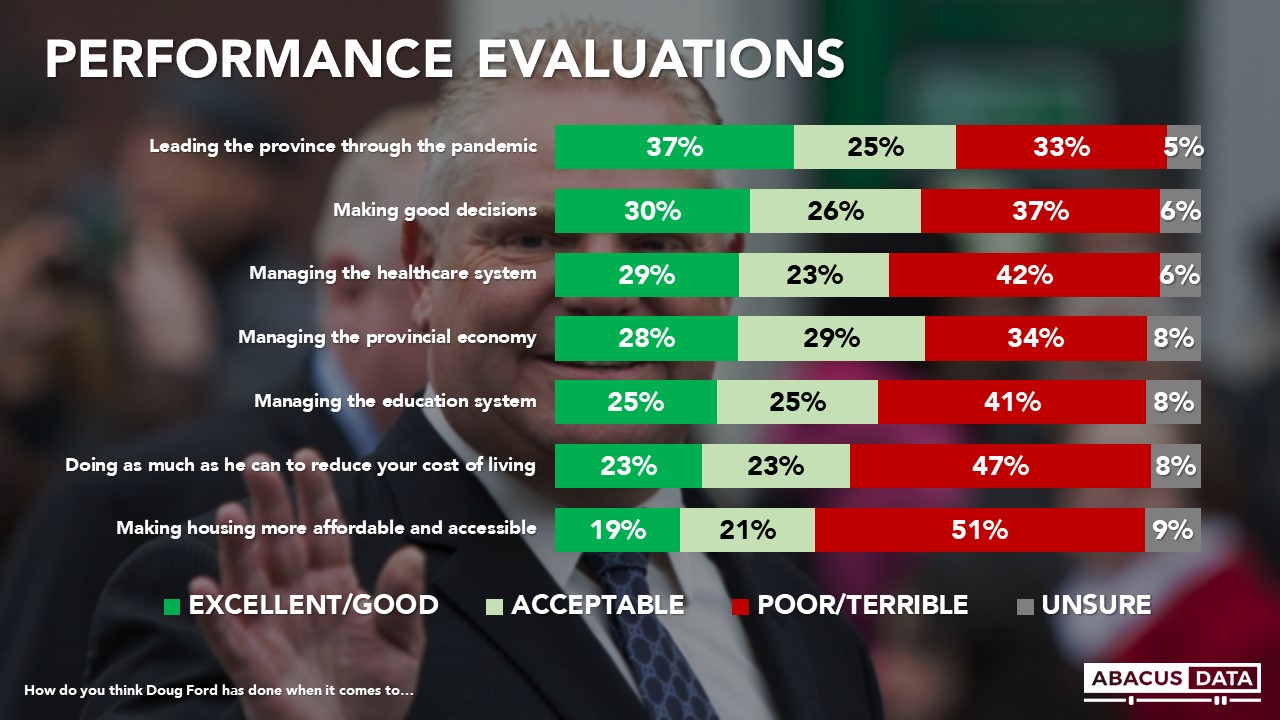
THE LEADERS
Overall, impressions of Doug Ford have improved since January. Today, 41% have a positive impression of the premier (up 9 points) while 38% have a negative impression (down 8) for a net score of +3. This is the best net impression score for the premier since early 2021 and far better than before the pandemic started.
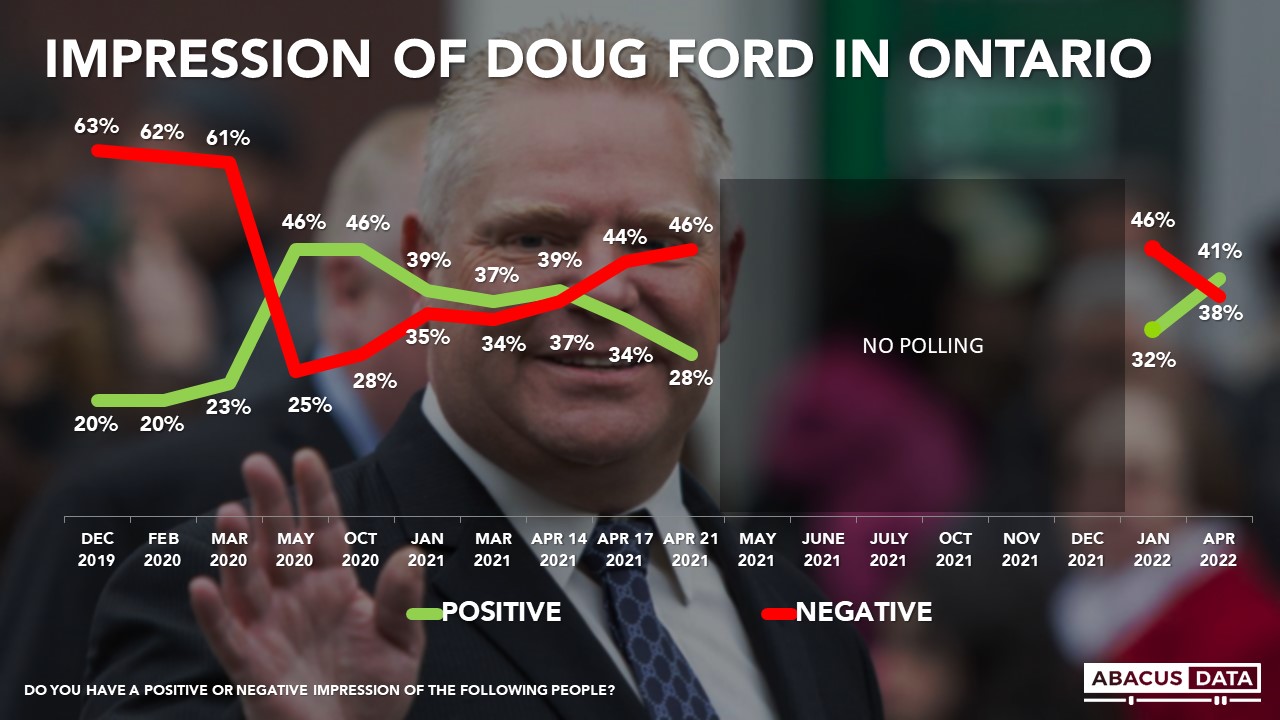
In contrast, all three main opposition leaders have net negative impression scores. Andrea Horwath is about even (31% positive and 30% negative, net score +1), Steven Del Duca (22% positive, 27% negative, net score -5), and Mike Schreiner (16% positive, 19% negative, net score -3) net negatively.
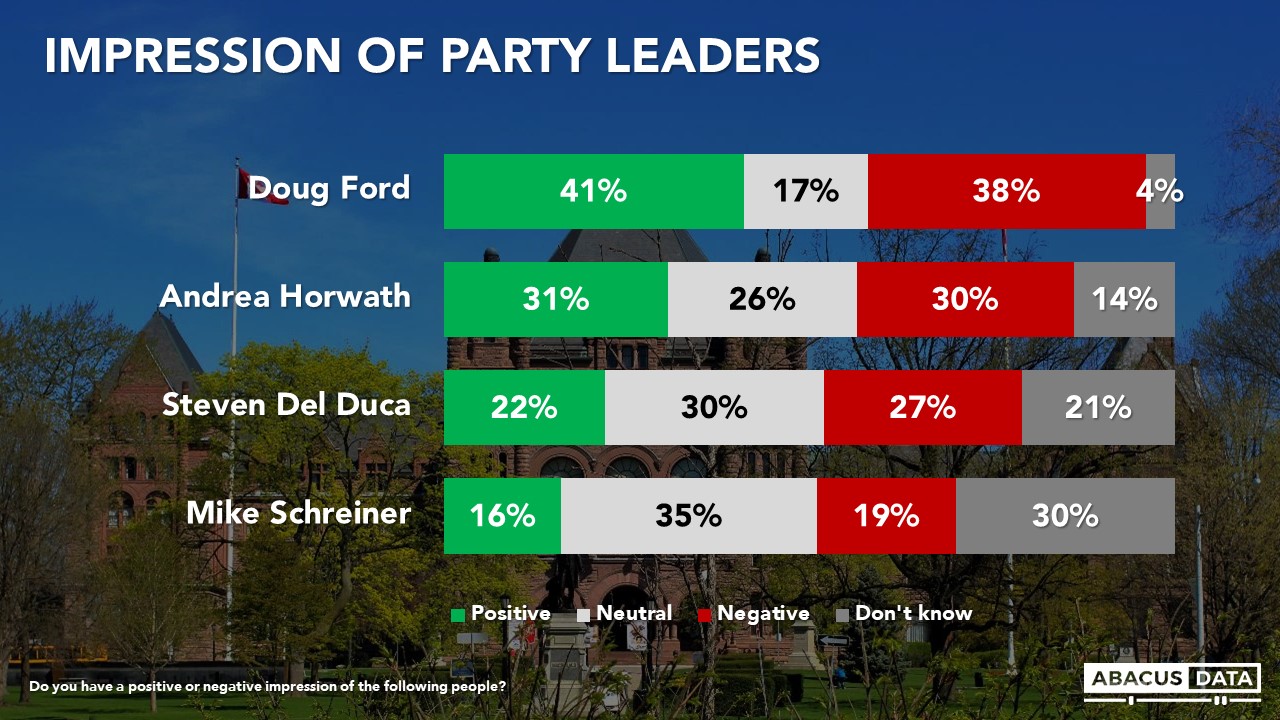
When tracking how well Ontarians know each of the major provincial party leaders, three of four have seen an increase in those saying they know the leader very or pretty well. However, a sizeable portion of the electorate still doesn’t know the three opposition party leaders that well.
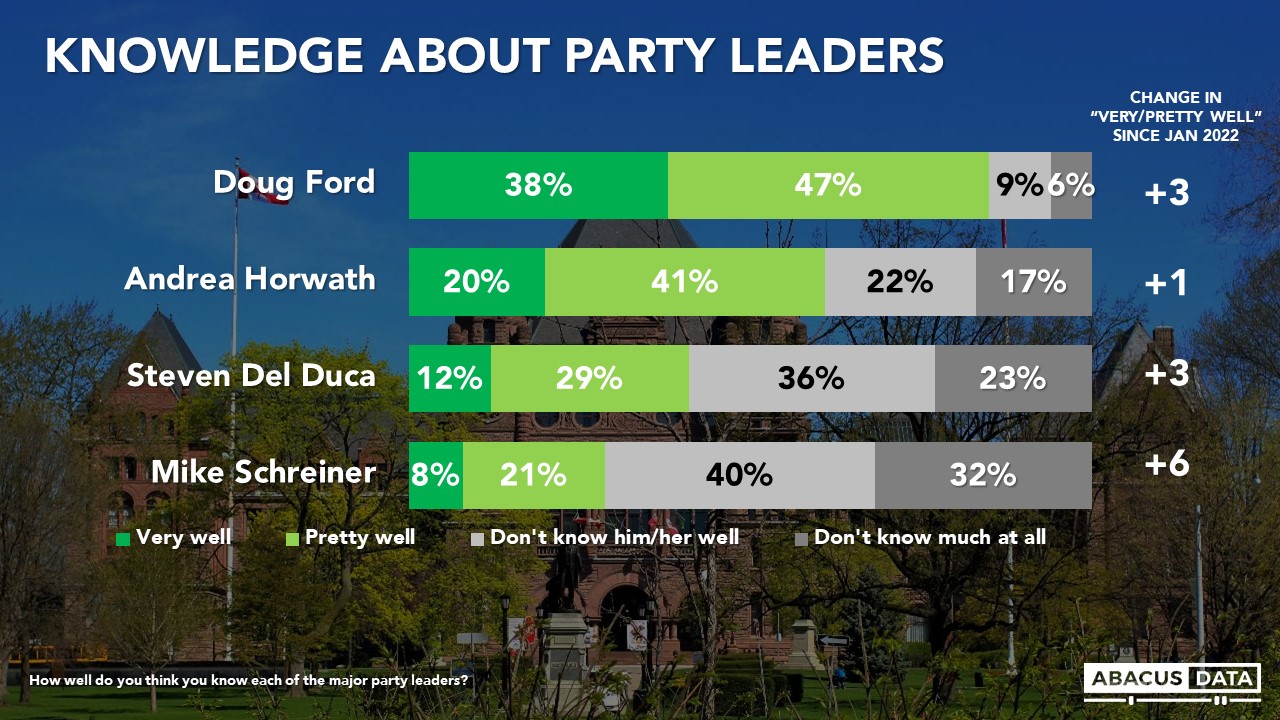
BEST PREMIER: FORD LEADS BY 18
When asked who they thought would make the best premier, 35% selected Doug Ford, followed by NDP leader Andrea Horwath at 17% and Steven Del Duca at 12%. This is a sharp contrast to vote intention which finds the PCs ahead only by 4 over the Liberals (more on this below).

When we compare perceptions about the best premier with vote intention, 81% of those who would vote PC say Doug Ford would make the best premier. In contrast, supporters of other parties are less convinced that the leader of the party they would vote for would be the best premier. For example, among NDP supporters, 58% think Andrea Horwath would make the best premier. Among OLP supporters, only 37% think Steven Del Duca would make the best premier. This shows that vote intention, at least at this point, is strongly correlated to who people think will make the best premier. We will watch this closely as the campaign begins and people become more familiar with the opposition leaders.

THE DESIRE FOR CHANGE
Right now, about half of Ontarians (49%) say they definitely want to see a change in government. That’s pretty consistent with our last survey in January which found 50% definitely wanted a change in government. Another 20% say it would be good to have a change, but it isn’t that important to them.
18% definitely want to see the PCs and Doug Ford re-elected while 13% say it would be good to continue with the same party in power, but it’s not that important to them.
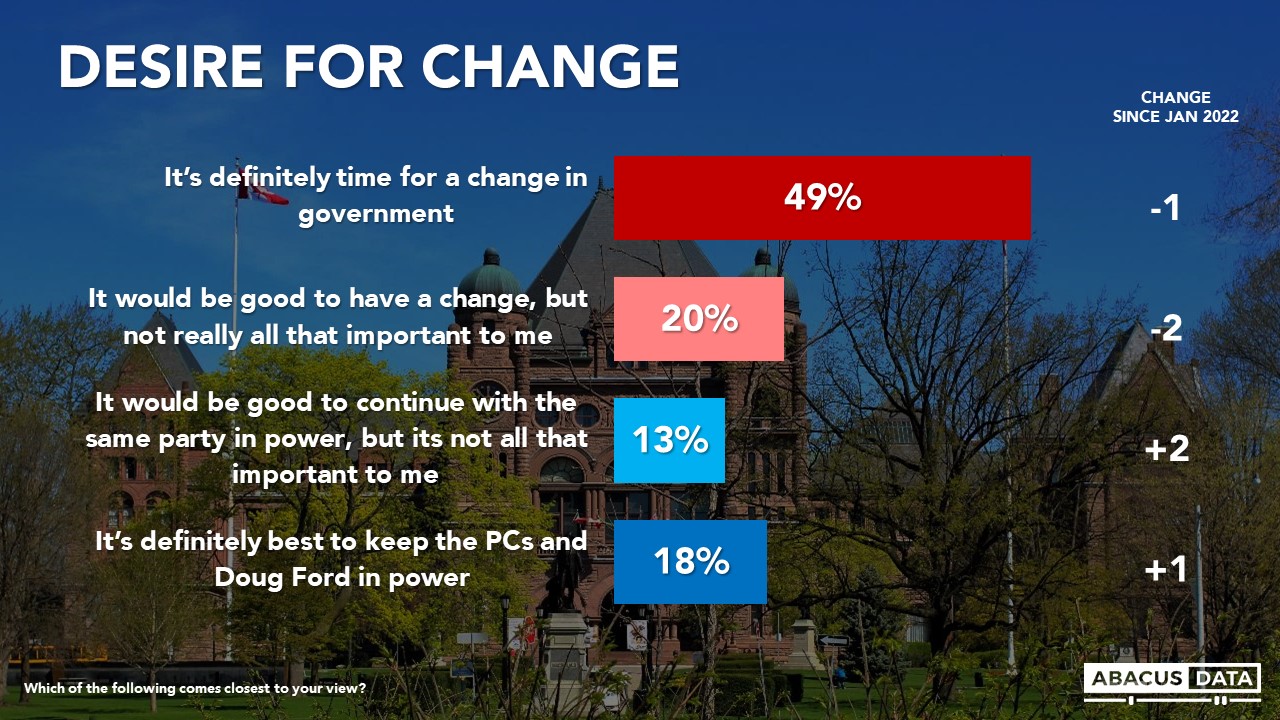
When we compare these results with the desire for change on the final weekend of the federal election or the week before the 2018 Ontario election, we find that the desire for change mimics what we saw federally in 2021 and is very different from the environment near the end of the 2018 Ontario election.

Among those who want to see a change in government, we asked what kind of change they want: big change from the PC government or some change that doesn’t move too quickly.
Overall, 57% of change voters want to see a big shift in direction while 43% want a more subtle change. Not surprisingly, those who definitely want a change in government are more likely to want to see big change than those who want change but say it’s not that important to them.

WHICH PARTY IS GOING TO WIN? MORE PICK THE PCs
A plurality of Ontarians believes the PC Party will win the upcoming election (37%) with 26% picking the Liberals. Only 12% feel the NDP will win. Overall, 24% are unsure who will win the election.

VOTE INTENTION: PCs LEAD BY 4 OVER THE OLP WITH THE NDP WELL BACK IN THIRD
When asked how they would vote if an election was held today, 36% of committed respondents would vote PC followed by the Ontario Liberals at 32% and the NDP at 23%. The Greens are at 6% while 4% would vote for another party.
Compared with our last survey in January, the PCs are down 1, the OLP is up 4 while the NDP is down 2.

Regionally, the PCs lead in the GTHA, eastern Ontario, southwestern Ontario, and in the north while the Liberals have an 11-point lead in Metro Toronto.

Age continues to play a key role in vote intention. Older Ontarians are far more likely to say they will vote PC than younger Ontarians.

Vaccination status is also related to voting intention. Among those with 1 or fewer COVID shots, the PCs lead the NDP by 22-points while among those with 3 or more doses, the PCs lead by 5. Among those who have only 2 doses, the OLP has a 7-point lead over the PCs.
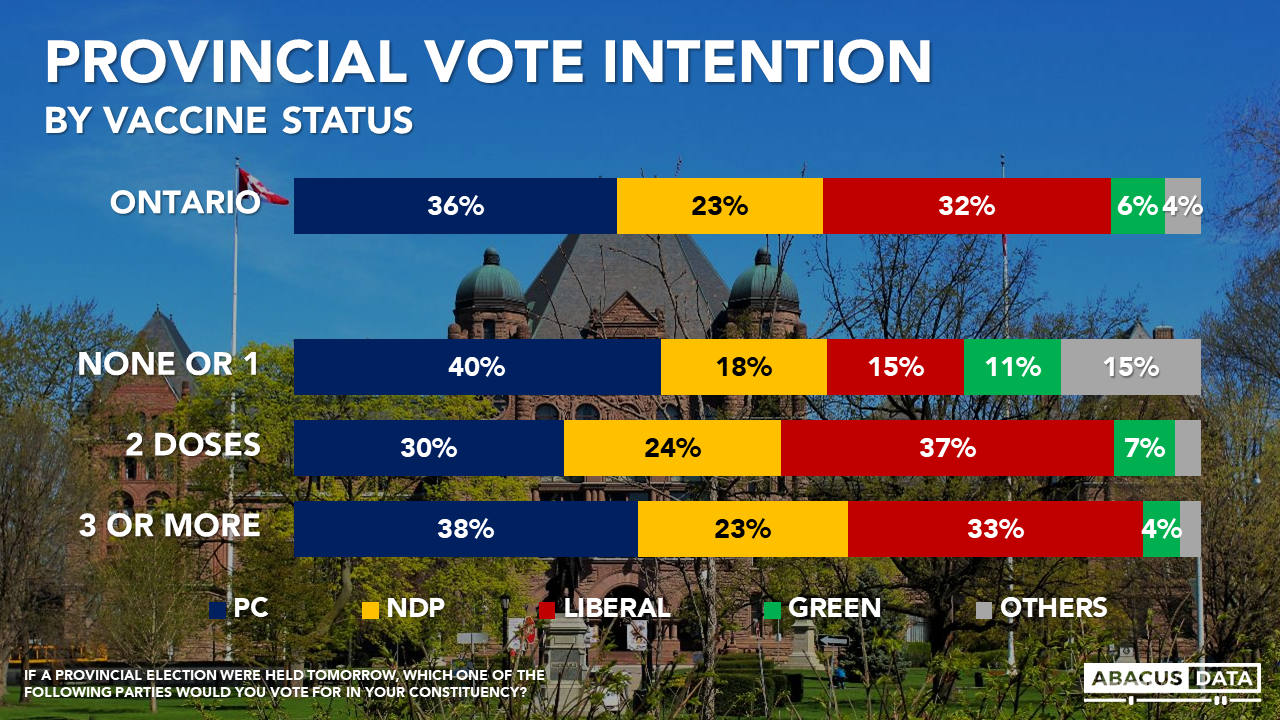
When we compare federal vote with current provincial vote intention, 78% of federal Conservative voters would vote PC today while 76% of federal NDP voters would vote for the Ontario NDP. Among federal Liberal voters, 67% would vote OLP while 17% would vote NDP and 14% would vote PC. Among those who voted for the People’s Party federally, 34% would vote PC while 20% would vote for another party.

UPSHOT

According to David Coletto: “With only a few weeks until the 2022 Ontario election kicks off, the opinion environment favours the PCs and Doug Ford. However, too many variables remain in play to make any prediction about how the election might unfold. In the lead-up to the campaign, Doug Ford’s personal image has improved markedly since earlier this year. He is now net positive and he’s less polarizing than he has been over the past year.
The cost of living is top of mind for more voters as housing, healthcare, and taxes round out the list of top issues. The PCs and Doug Ford have a natural advantage on that matter but are not immune to criticism about how their government has handled the issue.
While about half of Ontarians definitely want a change in government, the desire for change isn’t at a level where a PC re-election is in peril. The federal Liberals faced a similar environment in the lead-up to that vote.
Although the Ontario Liberals are within striking distance in the hypothetical ballot, other results in this survey suggest they still have a lot of work to do if they are going to win the election. Steven Del Duca remains unknown to a large portion of the electorate and those that do have an impression of him are more likely to view him negatively than positively. He is well back in third when respondents are asked who will make the best premier. What is unknown at this point is whether vote intention will align more closely with the perceived best premier or whether the Liberals can hold onto their support despite how people feel about Mr. Del Duca.
The Ontario NDP and leader Andrea Horwath have a more challenging path to replicate gains made in 2018 or even contest for power. Despite being the leader for over 13 years, many Ontarians still don’t know much about her and her net favourable rating is even. Worse, only 12% of Ontarians think the NDP will win the election, half as many who think the Ontario Liberals will win. If the NDP falls too far behind the Liberals, there is a real risk that change voters will consolidate around the Liberals.”
[sc name=”signup”]
METHODOLOGY
The survey was conducted with 1,500 eligible voters in Ontario from April 14 to 19, 2022. A random sample of panelists were invited to complete the survey from a set of partner panels based on the Lucid exchange platform. These partners are typically double opt-in survey panels, blended to manage out potential skews in the data from a single source.
The margin of error for a comparable probability-based random sample of the same size is +/- 2.1% 19 times out of 20.
The data were weighted according to census data to ensure that the sample matched Canada’s population according to age, gender, educational attainment, and region. Totals may not add up to 100 due to rounding.
This survey was paid for by Abacus Data Inc.
Abacus Data follows the CRIC Public Opinion Research Standards and Disclosure Requirements that can be found here: https://canadianresearchinsightscouncil.ca/standards/

ABOUT ABACUS DATA
We are the only research and strategy firm that helps organizations respond to the disruptive risks and opportunities in a world where demographics and technology are changing more quickly than ever.
We are an innovative, fast-growing public opinion and marketing research consultancy. We use the latest technology, sound science, and deep experience to generate top-flight research-based advice to our clients. We offer global research capacity with a strong focus on customer service, attention to detail, and exceptional value.
We were one of the most accurate pollsters conducting research during the 2021 Canadian election following up on our outstanding record in 2019.
Contact us with any questions.
Find out more about how we can help your organization by downloading our corporate profile and service offering.

